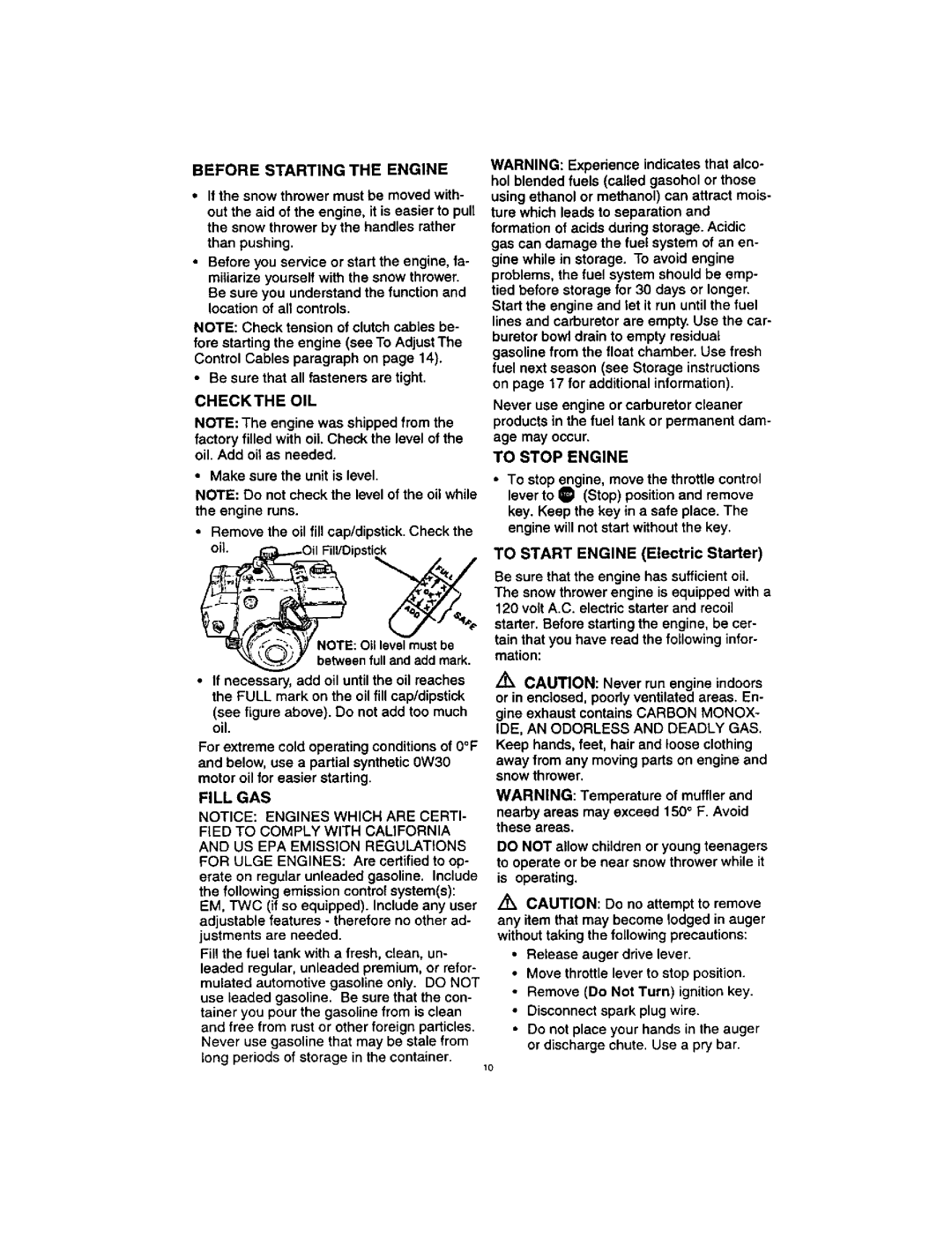
BEFORE STARTING THE ENGINE
•If the snow thrower must be moved with- out the aid of the engine, it is easier to pull the snow thrower by the handles rather than pushing.
•Before you service or start the engine, fa- miliarize yourself with the snow thrower. Be sure you understand the function and location of all controls.
NOTE: Check tension of clutch cables be- fore starting the engine (see To Adjust The Control Cables paragraph on page 14).
•Be sure that all fasteners are tight.
CHECKTHE OIL
NOTE: The engine was shipped from the factory filled with oil. Check the level of the oil. Add oil as needed.
•Make sure the unit is level.
NOTE: Do not check the level of the oil while the engine runs.
•Remove the oil fill cap/dipstick. Check the
oil. _Oil Fill/Dipstick
.*%
_',_)' NOTE: Oil level must be between full and add mark,
•If necessary, add oil until the oil reaches the FULL mark on the oil fill cap/dipstick
(see figure above), Do not add too much oil,
For extreme cold operating conditions of 0°F and below, use a partial synthetic 0W30 motor oil for easier starting,
FILL GAS
NOTICE: ENGINES WHICH ARE CERTI- FIED TO COMPLY WITH CALIFORNIA
AND US EPA EMISSION REGULATIONS FOR ULGE ENGINES: Are certified to op- erate on regular unleaded gasoline. Include the following emission control system(s): EM, TWC (if so equipped). Include any user adjustable features - therefore no other ad- justments are needed.
Fill the fuel tank with a fresh, clean, un- leaded regular, unleaded premium, or refor- mulated automotive gasoline only. DO NOT use leaded gasoline. Be sure that the con- tainer you pour the gasoline from is clean and free from rust or other foreign particles. Never use gasoline that may be stale from long periods of storage in the container.
WARNING: Experience indicates that alco- hol blended fuels (called gasohol or those using ethanol or methanol) can attract mois- ture which leads to separation and formation of acids during storage. Acidic gas can damage the fuel system of an en- gine while in storage. To avoid engine problems, the fuel system should be emp- tied before storage for 30 days or longer. Start the engine and let it run until the fuel lines and carburetor are empty. Use the car- buretor bowl drain to empty residual gasoline from the float chamber. Use fresh fuel next season (see Storage instructions on page 17 for additional information).
Never use engine or carburetor cleaner products in the fuel tank or permanent dam- age may occur.
TO STOP ENGINE
•To stop engine, move the throttle control lever to O (Stop) position and remove
key. Keep the key in a safe place. The engine will not start without the key.
TO START ENGINE (Electric Starter)
Be sure that the engine has sufficient oil. The snow thrower engine is equipped with a 120 volt A.C. electric starter and recoil
starter. Before starting the engine, be cer-
tain that you have read the following infor- mation:
Ak CAUTION: Never run engine indoors or in enclosed, poorly ventilated areas. En- gine exhaust contains CARBON MONOX-
IDE, AN ODORLESS AND DEADLY GAS. Keep hands, feet, hair and loose clothing away from any moving parts on engine and snow thrower.
WARNING: Temperature of muffler and nearby areas may exceed 150° F. Avoid these areas.
DO NOT allow children or young teenagers to operate or be near snow thrower while it is operating.
/_ CAUTION: Do no attempt to remove
any item that may become lodged in auger without taking the following precautions:
•Release auger drive lever.
•Move throttle lever to stop position.
•Remove (Do Not Turn) ignition key.
•Disconnect spark plug wire.
•Do not place your hands in the auger or discharge chute. Use a pry bar.
10
